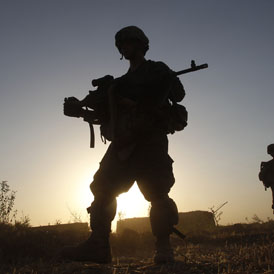Obama announces troop cuts in Afghanistan
France follows US President Barack Obama by outlining a phased withdrawal of troops from Afghanistan. Gary Gibbon looks at the political strategies at play in ending the decade-long war.
US President Barack Obama said on Thursday he would pull 10,000 troops from Afghanistan by the end of this year, followed by about 23,000 more by the end of summer 2012 and a steady withdrawal thereafter.
In a 15-minute televised address, Mr Obama said that the US would end military operations sparked by the September 11 attacks in 2001.
“Tonight, we take comfort in knowing that the tide of war is receding,” Mr Obama said, also ushering in the gradual drawdown of US forces in Iraq and the limited involvement in the ongoing international campaign in Libya.
“America, it is time to focus on nation building at home.”
The announcement may ease the way for speedier British withdrawals ahead of Prime Minister David Cameron‘s “deadline” of 2015 for the end of UK combat operations in Afghanistan.
Just hours after the announcement, French President Nicolas Sarkozy said its 4,000 troops in Afghanistan were on the same timetable as the US withdrawal.
Mr Sarkozy’s office said the French drawdown will take place in co-ordination with allies and Afghan officials and “in a proportional manner comparable to the withdrawal of American troops”.

Military chiefs ‘slapped-down’
Political Editor Gary Gibbon said that along with the US, the British withdrawal had echoes of election planning, despite fierce resistance from senior military figures.
“It’s quite well known that Team Obama before coming to office took the view that they would have to be withdrawing from Afghanistan by the time of the next presidential contest to have a decent chance of re-election (even if they’d surged in between),” Political Editor Gary Gibbon reported.
“It’s less well known that David Cameron and George Osborne had similar conversations before coming to office here.
“George Osborne formed the view that Afghanistan had to be receding from view by the time of the next election and he and David Cameron both believe that getting a fixed deadline for the withdrawal of British combat troops from Afghanistan, in the teeth of fierce resistance from senior military, is amongst their proudest achievements in office.
“There was a time when David Cameron himself used to say artificial deadlines for withdrawal – the old Lib Dem position – were unwise. That died some time ago. As William Hague said this morning, 2015 is a “no ifs or buts” deadline.”
Read more on the Politics Blog here.
Yet news that Obama will pull the entire ‘surge’ force he sent to Afghanistan in 2010 is certain to fuel friction between Obama and his military advisors who have warned about the perils of a hasty drawdown.
Last week, the top US commander in Afghanistan General David Petraeus asked the President to hold off on ending the Afghanistan troop surge until autumn 2012. And both Secretary of Defense Robert Gates and Secretary of State Hillary Clinton had expressed concerns over the speed and numbers of the troops being pulled out.
Read more: Why Afghanistan exit means talking to the Taliban
However, Nato Secretary-General Anders Fogh Rasmussen, welcomed the move.”I have spoken with President Obama. I welcome his announcement to begin the drawdown of US forces in Afghanistan in July,” he said.
“We can see the tide is turning. The Taliban are under pressure. The Afghan security forces are getting stronger every day. And the transition to Afghan security lead is on track to be completed in 2014.”
The 100,000 US troops in the country are three times as many as when Mr Obama took office. By drawing down the 30,000 reinforcements, there still will be uncertainty about how long the remaining 70,000 troops would stay there, although previously the US and Britain indicated December 31, 2014, as a target date for ending the combat missions there.

